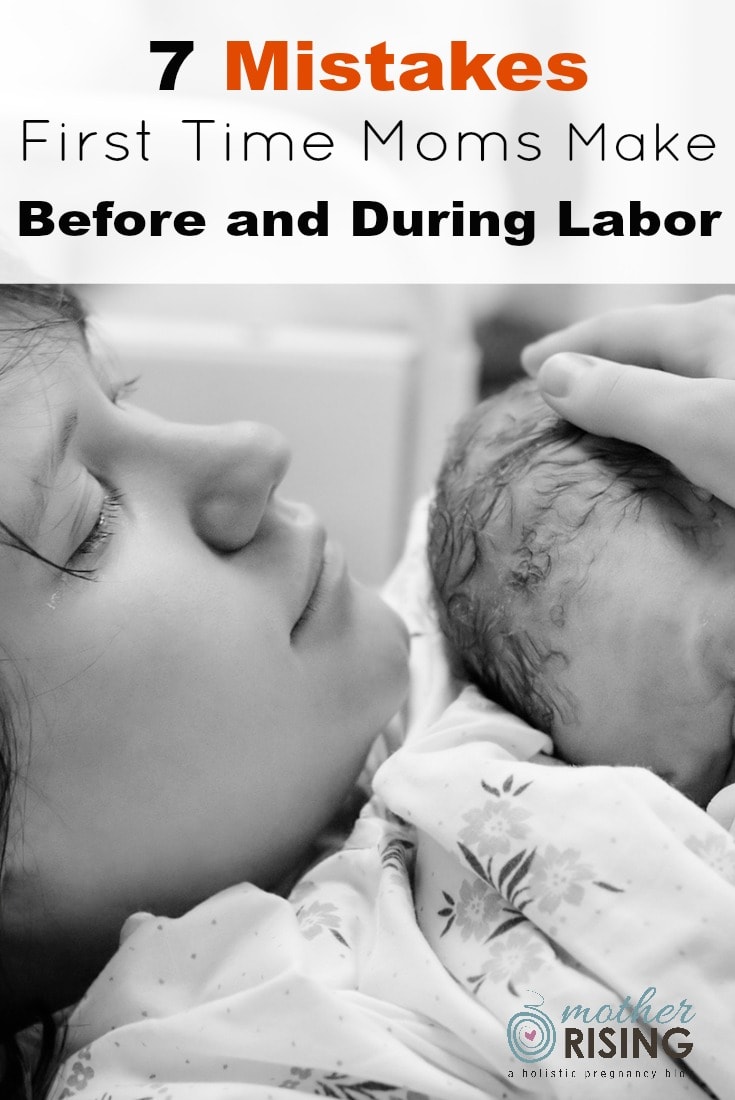The tone of this post may come across as a bit more negative and judgmental than my typical posts. But ladies, I have somethin’ to say, so listen to me good. After watching mainstream childbirth videos (… think Baby Story) I have realized that there are some huge mistakes first time moms make before and during labor (even if they’re planning for an epidural). 7 to be exact.
Honestly, I’m a little tired of hearing about how the medical model has failed women. Yes, it has… obviously. But today I’d like to shed light on a different perspective – that the medical model of birth is not entirely to blame. Medical professionals and their system of labor management is only part of the problem.
Throughout this blog post and in the end, I hope to encourage women to be an active participant in their pregnancies and births, to realize their strength and weaknesses, and look fear in the face. Ignorance and passivity gets us nowhere.
The following are 7 huge mistakes first time moms make before and during labor, even when planning for an epidural.

7 Mistakes First Time Moms Make Before and During Labor
I’ve broken up this post into two sections
1) the mistakes first time moms make before labor and
2) the mistakes first time moms make during labor.
Mistakes First Time Moms Make Before Labor
Doubt Ability to Cope Through Labor
One of the big mistakes first time moms make before labor is to doubt their ability to cope through normal labor sensations. Women may get the idea that they can’t give birth without extensive help from medical professionals because…
- Mothers tell their daughters it’s too hard.
- Strangers at the grocery store say “get the epidural”.
- Co-workers question their choices and share “bad” birth stories.
Our culture is uncomfortable with the normal sensations of natural childbirth, or anything that pushes us outside of our normal limits – our comfort zones. They hypnotically tell pregnant women, “Why make yourself suffer? Get the epidural.”
Ladies, don’t listen to this nonsense. You and your body are fearfully and wonderfully made. A woman’s body was designed to give birth. You absolutely have the ability to give birth. I believe in you!
Fail to Learn Coping Mechanisms (Even If Planning for an Epidural)
Another big mistake a first time mom makes before labor is to fail to learn coping mechanisms (pain coping practices) – especially those that plan for an epidural.
Using pain medication in labor is not a “get out a jail free card” for birth.
Even when planning for an epidural, women still have to cope with natural birth…
- before arriving to the hospital
- throughout triage
- during the admission process
- after the initial request for pain relief
- during the placing of the epidural
- while the epidural is taking effect
Even when the epidural is working most women still feel lots of pressure and discomfort. Some women even report an epidural working only on one side. Or not at all! If that’s the case, you will need to know how to cope through a “re-do” of an epidural (or it never working at all).
It is imperative to learn coping mechanisms no matter what type of birth is planned – natural, epidural, cesarean, whatever. Take a quality childbirth class to get you started.
Don’t Prepare for Multiple Birth Scenarios
It’s impossible to control a birth experience. You can influence it… but not control it. Even if you have your heart set on a natural, vaginal delivery, It’s important to explore other avenues of birth.
If ________ were to happen, what exactly are my preferences?
EX: What are some things you would like to have happen if, for whatever reason, a cesarean birth became your next best thing?
It’s important to plan for a cesarean without necessarily expecting one. (Trust me, thinking about preferences for a cesarean birth won’t make one more likely to happen.) I believe in you!
Mistakes First Time Moms Make During Labor
Now that we’ve talked about mistakes first time moms make before labor, let’s talk about during labor.
Surprised by the Intensity of Labor
A common thread in the recount of a woman’s birth story is that the sensations of labor surprised them. They were shocked at how painful and overwhelming their experience was. They were surprised by how primal the ordeal felt and taken aback at the power that came within themselves.
“Most Western women have never been physically tested until we go through labor and birth. Most of us are fortunate enough to never have gone eighteen or twenty-four hours without food or sleep. Few of us allow ourselves to go a day and night or two days and nights without a bath or shower, without brushing our teeth and doing our hair and makeup. Even fewer of us would allow anyone else to see, smell, or touch us, unwashed, sweat-soaked, naked, oozing mucus, blood, and feces from our nether regions. When faced with the forces of labor, we can’t hide the fear, the anxiety, the response to pain. All the inhibitions and trappings of our social selves are peeled away as our bodies thrust and heave, vomit and grunt, cry and leak. The animal is there for everyone to see.” Hard Labor, Susan L. Diamond
Most women have never done anything extremely difficult, never been tested beyond their perceived limitations. When it comes time for active labor (never mind coping through transition), they feel that they have been led to believe that labor would be hard, but not this hard.
Because they have no tolerance for pain, have never done something this difficult and because they have not learned coping mechanisms, they are surprised and afraid – which tenses the body and creates more pain. Fear leads to tension which leads to pain… which leads to fear, which leads to tension which leads to more pain.
During pregnancy they tell themselves that women have been doing this for centuries, what’s the big deal? They fail to realize that there’s more to it than “our ancestors survived and so will I”. It’s important to prepare ahead of time for childbirth. You can do it!
Go to the Hospital Too Early
A common mistake that first time moms make during labor is that they go to the hospital too early.
Because most women have no real frame of reference for the intensity of normal labor, as soon as they experience signs of labor they assume that what they’re experiencing is hard labor and head on in to the hospital. Some women don’t know how far apart contractions should be before heading to the hospital.
Many first time moms get to the hospital during early labor thinking birth will happen at any moment. 24 hours later, they have a baby.
(Second time moms know better, and labor at home as long as possible.)
Do some research, take a good childbirth class and prepare for the intensity of labor. You’ve got this!
Expect Medical Professionals to Save Them
Because women have not developed coping mechanisms and are at the hospital too early, another one of the mistakes first time moms make during labor is to expect medical professionals to save them.
Here’s the scenario:
A first time mom labors at home for a few hours. Her contractions become regular, strong and are about 4-5 minutes apart. Between contractions she seems like her normal self and can carry on a conversation, but during contractions all of her attention is required to maintain her deep slow breathing, which is working for her. Since it seems difficult, and obvious that she’s in labor, she heads to the hospital to have a baby. In triage she receives a vaginal exam and is told she’s 3, maybe 4 cm dilated. Because of the intensity of the contractions that she is feeling, she is shocked that she is not further along. She quickly jumps ahead in her mind and thinks that if birth is this intense at 3 to 4 cm, there’s no way she can do this all the way to 10 cm. And then be expected to push out a baby! She begins to panic and looks for a way out, someone to save her.
When a women finds herself in this situation, instead of looking to herself and her resources, she look for someone (likely her nurse or other care provider) to save her from her experience.
What she has failed to realize that there is no way to save her – no matter what ends up happening. This is something she has to do – whether a natural birth, mediated or a cesarean.
Giving birth is hard! It hurts! But you can do it! I promise!
Submit to the Cascade of Interventions Without Asking Questions
At this point the carefully worded birth plan flies out the window, the seasoned nurses (in their heads) say I told you so and the laboring mother submits to the cascade of interventions without asking questions.
The cascade of interventions is the rapid succession of medical procedures given where one relies on the other, typically for the safety of the mother and baby. For example…
- an epidural requires a bag of fast dripping fluids to prevent a sudden drop in blood pressure and
- constant fetal monitoring to monitor how the baby reacts to the epidural and
- movement is restricted to her bed for safety reasons, and so on.
Because the mother is looking for her care provider to save her, she submits to the cascade of interventions and asks no questions. Instead of being an active participant in how her birth unfolds, she lets the medical professionals make all the decisions. Because of her passivity, she has removed herself from being an active participant in her care.
Unfortunately, this mindset often continues in regards to medical decisions for the baby once it’s born.

Second Time Moms Have Wisdom
Second time mothers use their first experiences to activate resources and find solutions to the problems of their first births. These mothers are no longer ignorant, but strive to make wise decisions moving forward.
Finds Her Tribe
First and foremost, a second time mom finds her tribe. A tribe is a group of women that validate her as a person, her experience and hopes for the future. They motivate her to put her boots to the ground and get to work. A tribe helps her become educated about whatever it is that she needs to know. They walk with her on her journey and celebrate who she has become.
A tribe speaks her language. They get her.
A tribe is the missing piece to many women’s transformation to motherhood.
(Have you read Ina May’s Guide to Childbirth? It’s one of the best pregnancy books out there. In the book she describes the effects of women having a tribe – better birth outcomes, to name just one.)
Cherry Picks a Care Provider
Another thing a second time mom does is cherry pick a care provider. Often, when a woman becomes pregnant she stays with the gynecologist she has always used, without researching if this doctor is the best choice for birth. A good gynecologist does not always equal a good obstetrician.
Second time moms poll their community and find a care provider that will best meet their individual needs – which might not be the same needs of a neighbor or co-worker. Sometimes women even fire their OB.
Takes a Good Childbirth Class
I have had many seasoned parents take my regular six week childbirth class because they:
- didn’t the first time around and
- want this second birth to go differently.
It’s never too late to take a childbirth class!

Cultivates Coping Mechanisms
The second time mom understands that in order to cope through the normal sensations of pain, she has to develop coping mechanisms. These are learned in a Birthing From Within childbirth class, through meditation, an exercise class or even yoga.
Whatever path she chooses to learn resilience, she recognizes how important it is to implement this practice into her daily life.
Hires a Doula
The first time mom relies on nurses, her partner or even the idea that “my grandmother’s grandmother survived, so I will too”.
The second time mom, however, builds her birth team ensuring she is supported how she so desires. Often, this manifests itself through a doula.
(Doula Match is a great resource for finding a doula in your area.)
Reads Good Books
Another way a second time mom fosters a better birth experience is to read really good pregnancy books, and not rely on mainstream books like What to Expect.
There are many good pregnancy books out there, take your pick! Just please, choose something besides What to Expect. How about Birthing From Within?
Prepares for Multiple Possibilities
It is naive to believe that because you desire a very specific birth scenario, that it will happen exactly as imagined. Second time mothers understand this.
Not only do seasoned parents plan for the birth of their dreams, but they also have a contingency plan (or two). In case plans change, they will have a better idea of what they want or don’t want in this new situation.
Many parents prepare for a cesarean birth without expecting one. And at the same time plan for a vaginal birth after a cesarean (VBAC).
Works Through Birth Fears
If preparing for a cesarean birth without expecting one sense shivers up your spine, you may have some birth tigers (fears) to work through.
The best way I know how to work through these issues is to take a Birthing From Within childbirth class. Make sure to request the instructor to lead you through a “birth tiger safari”.
This exercise is wildly popular in my area, and one of the big reasons women take my class over other classes.
Labors at Home
Finally, to avoid the mistakes first time moms make before and during labor, second time moms learn how to labor at home as long as possible (without having a car baby!).
For the right person, laboring at home will decrease pain and make a more pleasurable birth experience.
7 Mistakes First Time Moms Make Before and During Labor
To recap, here are the 7 mistakes first time moms make before and during labor.
- Doubt Ability to Cope Through Labor
- Fail to Learn Coping Mechanisms (Even If Planning for an Epidural)
- Fail to Prepare for Multiple Birth Scenarios
- Surprised by the Intensity of Labor
- Go to the Hospital Too Early
- Expect Medical Professionals to Save Them
- Submit to the Cascade of Interventions Without Asking Questions
What are your thoughts about these mistakes first time moms make before and during labor?
Leave me a comment and let me know what you think.




Haley
Monday 15th of May 2023
Thank you so much for writing this. I’m a momma to be in waiting for my not quite yet miracle and trying to learn all I can. I love how you reference we are fearfully and wonderfully made and offer realistic expectations. Thank you!!
NW, DNP, PMHNP, CPM
Thursday 14th of November 2019
I think this article was intended as an education piece but maybe not presented in best communication efforts. These are choices that can better be planned out in order to execute a more positive birth experience. ...Rather than mistakes...mommas have enough guilt...we are here to support each other and lift up,
Dannielle
Wednesday 6th of November 2019
Now now girls, you're all pretty. Best of luck to all the first, second, twelfth time mother's out there. Yay babies!
Jessica
Sunday 22nd of September 2019
Yeah, super rude. How exactly are we expected to know the intensity of childbirth when we haven't experienced it?? Congradulations. Ypu know better than us first time moms. And you broadcasted that in a very rude and unnecessary way.
Christine Nguyen
Thursday 19th of September 2019
Thank you Lindsay, this was beautifully written. You should keep doing what you're doing. There is too much fear surrounding labor and both. We need people to speak up and educate women about our inner strength. I was very surprised and disappointed to see some of the comments in this thread. Women should be supporting each other. I'm glad that you are taking a stand to shed light on what our society lacks. America has the highest interventions along infant mortality rates among developed countries. That's no coincidence, there's clearly an issue with our birth system. We need to work together to solve this issue no matter how ugly the truth is. Our bodies were meant to do this ladies!